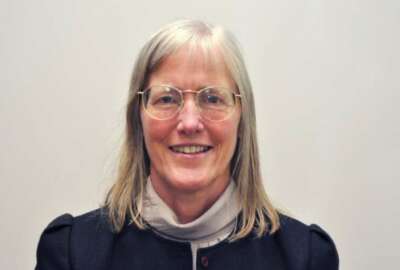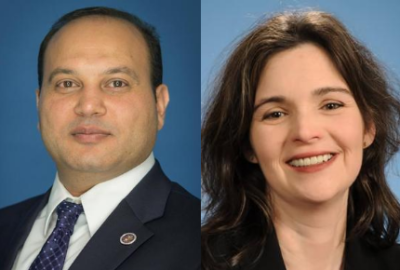
New NASA mentor program links Boeing, Southern University
NASA has signed its newest mentor-protégé agreement. The latest arrangement is between Boeing and Southern University in Baton Rouge, Louisiana.
Best listening experience is on Chrome, Firefox or Safari. Subscribe to Federal Drive’s daily audio interviews on Apple Podcasts or PodcastOne.
NASA has signed its newest mentor-protégé agreement. The latest arrangement is between Boeing and Southern University in Baton Rouge, Louisiana. Under the 18-month program, the historically black university will get new expertise on how to win federal contracts. And Boeing will get a pipeline of engineering students to help fill jobs at the nearby Michoud Assembly Facility, where it’s helping to build NASA’s new Space Launch System. For more on how the partnership will work, Federal Drive with Tom Temin talked with Samuel Washington. He’s the director of Southern University’s Office of Governmental Contracting Services.
Interview transcripts:
Samuel Washington: This agreement does a lot of things for the university. First of all, it provides training and business development for Southern as a protégé. And this training and business development done based on what they call a need assessment, which means that Boeing and Southern actually agreed on some of the things that the large corporations can provide to the university. This agreement also provides enhanced capacity for contracting opportunities, which is the main thrust of all of this. A lot of HBCUs, a lot of schools, they are acquainted with grants, but they’re not acquainted with contracts. They are large opportunities out there for schools being able to efficiently do contracts, and contract work. And we’ve done that for some time. This agreement actually helps us to enhance our capabilities, to make us more efficient. And the training, we have milestones over an 18 month period in which we will participate in the training. And all of this provides opportunities for our faculty, our staff, and students.
Jared Serbu: Yeah. And to that last point, you’ll correct me if I’m wrong on this, but the agreement is only for 18 months. But I think the relationship probably extends well beyond that, because I think the entire point is to help Southern University get a better understanding of how to build those business relationships and earn subcontracts through Boeing and probably other aerospace companies. Is that fair?
Samuel Washington: That is correct. It could go longer than that, because — let me kind of roll back a little bit — we’re actually supporting the Space Launch System inNew Orleans at the Michoud Assembly Facility. And Boeing supports Artemis, the Artemis program. And that’s the program that will allow our astronauts to go to the moon, and we are part of that partnering endeavor to do just that.
Jared Serbu: Is this primarily something that you think will benefit students, faculty, alumni, all of the above?
Samuel Washington: Oh, yes. Yes. Actually, we have five engineers that are on site there at Michoud. And we have faculty now that are actually, they’re doing various task orders and things like reliability engineering, as well. We’re trying to get to the point where we can actually do some testing on composites and things like that at are University.
Jared Serbu: And we’re primarily within Southern University do you expect to draw your talent from? I’m not sure if you have an actual aerospace program.
Samuel Washington: It’s in our College of Engineering. And we can use our mechanical, electrical engineers, electrical engineering Technology. We can also use some of our computer engineers, computer science graduates, because they have access to these like artificial intelligence and Internet of Things like that, as well as robotics and other areas. So it’s largely drawn from, I’m going to say the department is a College of Science and Engineering. And this will also encompass our computer science department.
Jared Serbu: From Boeing’s perspective. And I realized this is really a question for Boeing, but is one of the drivers for them here that it helps them fill some particularly hard to fill skill areas at Michoud and other places.
Samuel Washington: That is correct and what has been going on for the first several years is the fact that there’s a deficit of engineers in the manufacturing arena. And yes, Boeing and a lot of the other aerospace engineering companies, they are in need of engineers. And so this definitely helps them and helps fulfill some of their diversity requirements or opportunities for African American engineers, but they really need just engineers in general. And so we’re helping them do that. As well as we’re supporting the Louisiana Workforce Development Initiative for the state.
Jared Serbu: You mentioned that this is the first time Boeing assigned one of these mentor protege agreements with an HBCU. I’m just curious, from your perspective, how difficult was the agreement process to navigate between NASA bureaucracy and building the Boeing relationship? What was the process like?
Samuel Washington: Well, yeah, you’re exactly right, difficult. There are 102 HBCUs. And then in addition to some minority institutions, but I think it had a lot to do with our past capability, because we’ve been doing contracts for several years. And so we actually had some experience in providing contracts, for instance, for the Army Corps of Engineers, for Jacobs Engineering, and a lot of other firms, which we were prime contractors, and we were subcontractors as well.
Jared Serbu: So it helps to have a little bit of experience with the federal contracting bureaucracy, which it sounds like you definitely do.
Samuel Washington: It does. It really does.
Jared Serbu: Do you have a sense yet for how many students or faculty or alumni might ultimately benefit from this partnership? I realize it’s very early.
Samuel Washington: I cannot say in terms of the number, but at any time we have students with the background and some experience, and Boeing is definitely interested. It’s not only Boeing, it’s most of the other companies, not only in aerospace, but right now in the chemical industry. We’re in the quarter in Baton Rouge. So it’s there’s a lot of competition for engineers. Boeing being the mentor, they would certainly like to engage as many as we can to provide for them with the the requirements and with the background that’s needed.
Copyright © 2024 Federal News Network. All rights reserved. This website is not intended for users located within the European Economic Area.
Tom Temin is host of the Federal Drive and has been providing insight on federal technology and management issues for more than 30 years.
Follow @tteminWFED





